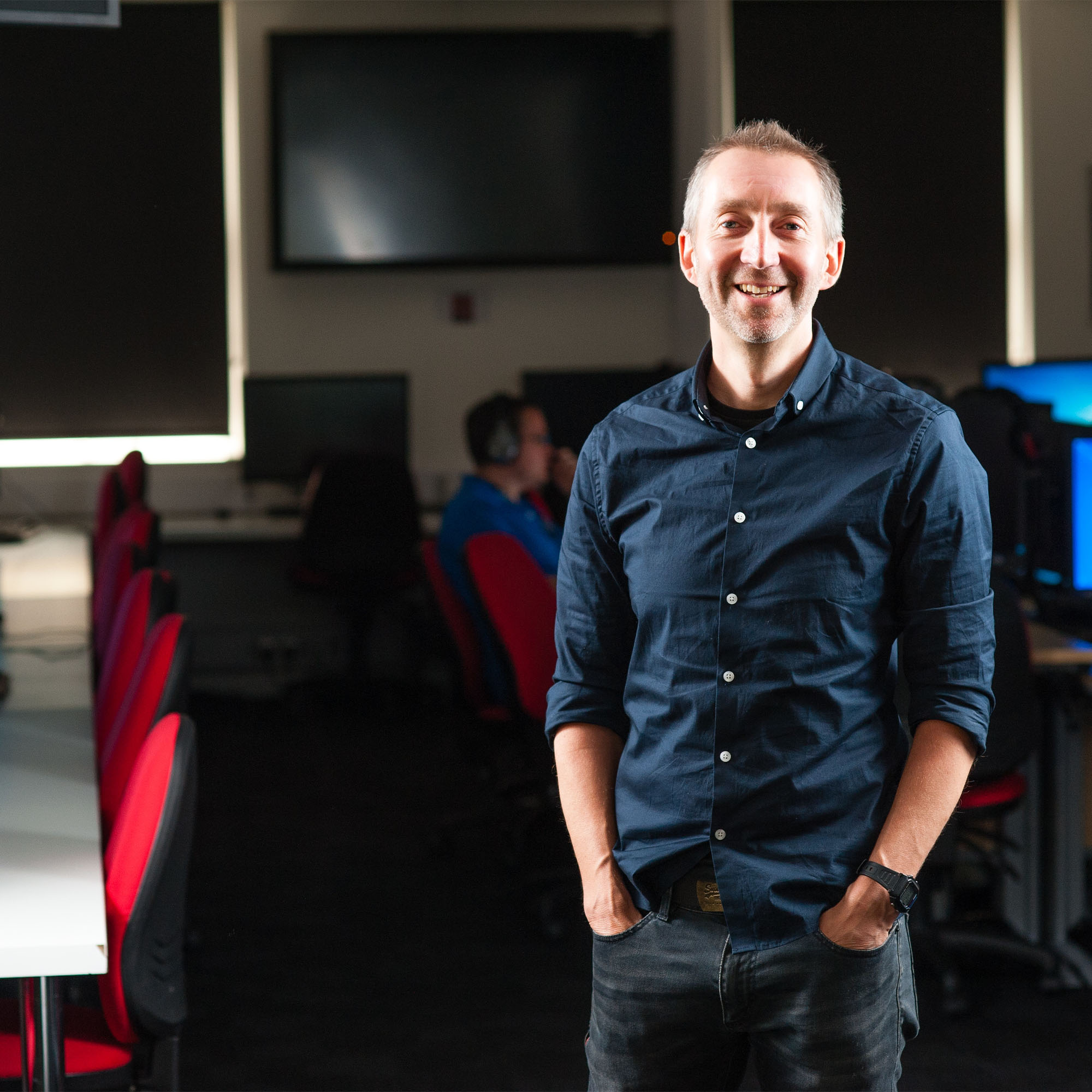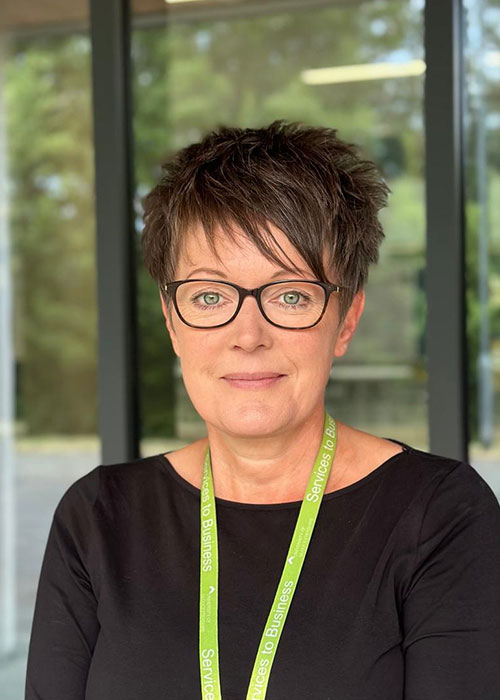This is a level 6 Digital and Technology Solutions Degree Apprenticeship, of which there are four pathways: Software Engineer, Cyber Security Analyst, Data Analyst and Network Engineer.
Software Engineer
Looking to begin an apprenticeship?
About the Digital Technology Solutions (Software Engineer) Degree Apprenticeship
The Digital Technology Solutions Degree Apprenticeship is designed to allow learners to specialise in one of four areas:
- Software Engineer
- Data Analyst
- Network Engineer
- Cyber Security Analyst
Learners combine work and study to build core skills and knowledge required for the implementation, maintenance and support of security controls that protect an organisation’s systems and data assets from threats and hazards.
Apprentices start to specialise from year two, and they graduate with a BSc (Hons) in Digital and Technology Solutions.
Teaching is delivered over 3 years via weekly day release, and the programme is coursework based, meaning no exams (as these do not replicate real-world working environments in the computing industry).
This apprenticeship is accredited by TechSkills – the industry accreditation body for digital and tech education. It means that our apprenticeship meets the high industry standards set by TechSkills for quality and tech/digital career relevance.
Working in partnership with:

What are Degree Apprenticeships?
Degree apprenticeships are a fantastic way to upskill employees and train new staff. They contribute to improved competitiveness and productivity, as well as increased staff retention.
Degree apprentices study for higher level qualifications alongside working. As such, they spend at least 6 working hours each week carrying out ‘off-the-job training’ where they study for their degree and gain the knowledge, skills and behaviours that are required to successfully complete the apprenticeship.
Large employers can use their apprenticeships levy to pay for apprenticeship training. Smaller firms can claim up to 95 per cent of these costs from the Government. This means apprenticeships are a cost-effective choice for both the employer and learner.


Meet the lecturer
Dr Richard Cook, Academic Course Leader
Richard teaches across undergraduate and postgraduate modules, bringing more than 20 years of experience in education and technology.
Before joining University of Gloucestershire, he worked as a web developer, an IT consultant in Cheltenham, and at a London start-up, as well as holding academic positions at Sheffield, Bath Spa and Swansea universities.
His teaching and research explore how people interact with technology in everyday life. He has a particular interest in subcultures, creative approaches to research, and how emerging technologies like AI and machine learning shape the way we live, work and communicate.
Richard co-founded Eth.Lab, a collaborative research group, and his PhD focused on the use of voice assistants in school classrooms.
Modules
In Year 1, learners from all four pathways take the same modules so they build the core knowledge and skills necessary to then specialise in their chosen area from Year 2. An independent work-based project underpins classroom content, so apprentices are applying their learning in the workplace from day one.
Computers and Security
This module introduces the core concepts of computers and security by considering the design and operation of computers and computer networks, the implications of security and how computers may be programmed.
Principles of Programming
This introduces the principles of programming and develops an understanding of problem solving techniques for software development using a programming language.
Object Oriented Programming and Software Design
This module gives learners an understanding of the object-oriented programming paradigm in the context of developing software that is well specified, designed and tested. Learners will be exposed to a variety of notations at different stages of the development process.
Systems Design
This introduces software engineering principles and practices necessary to developing quality software-intensive systems for business use. Learners will be introduced to working in teams to identify business requirements and turn these into practical, workable solutions.
Web Development
This module covers the business rationale for using the web as a solution to a business problem, together with the core technologies required to create such solutions. Learners will create structured websites using both scripts (eg HTML, CSS; JavaScript, PHP, MySql) and industry-standard software (eg Adobe DreamWeaver).
Independent Work-Based Project
This project applies theories and principles integrated from modules studied already. Learners identify an issue/problem that needs solving and produce a piece of work that demonstrates understanding and application of theories and principles.
In Year 2, learners continue to build core skills, while also specialising as a Data Analyst. They will also enhance their project management skills and explore key ethical issues.
Agile Methods
This module explores the deployment and application of key Agile approaches to software management development and wider business development models.
Professional Issues
This introduces learners to the professional and ethical issues surrounding computing disciplines. Learners consider these professional and ethical issues in a business context.
Managing the Security of Information
This module looks at the security of information and how it can be managed to ensure confidentiality, integrity and availability. It encompasses the role of the Information Security Officer, security policies, standards and managing user activities.
Supervised Professional Work Experience
For this module learners undertake a supervised work-based activity focussing on the application of learnt theories to their place of work as well as how learning has impacted their employment. They identify a workplace issue/project collaboratively with their employer, in which they will apply theory to the workplace and evaluate this application.
In Year 3, learners further develop their academic skills by demonstrating deeper understanding that draws upon all their studies to date, as well as the practical experience they have gained in the workplace.
This year has a more strategic focus where learners are required to develop solutions around system change, and consider the role of IT in forwarding wider business objectives.
Advanced Topics in Technology and Innovation
In this module learners research current innovative issues in technology. Topics will be introduced in a series of lectures and then discussed in seminars with learners contributing written and verbal content.
Strategic Business and IT Management
This module broadens learners’ critical perspective on the strategic aspects of information systems in business. It focuses in particular on the integration of information systems strategy with business strategy to support business value.
Managing Information Systems Change
This broadens learners’ critical perspectives on strategic aspects of managing information systems driven change. It focuses in particular on the successful integration of information systems into the organisation through management of the change process.
Digital Technology Solutions Synoptic Project
This module assesses the knowledge, skills and behaviours that are detailed in the approved Apprenticeship Standard for Digital Technology Solutions Professional and are completed during the final stages of the apprenticeship. Successful completion of this module (which resembles the (EPA) end-point assessment) signifies completion of the apprenticeship, as well as the full degree.
Year 2
Internet of Things Development
Apprentices will learn to understand the Internet of Things (IoT), developing IoT devices and incorporating programming techniques to facilitate the process of data collection, actuation and communication in IoT devices.
In this module apprentices will learn about the types of IoT devices, various communication strategies and protocols. They will also learn how to develop their own IoT device and program it accordingly. Finally, they will analyse and examine the relation between IoT, Big Data and the cloud and how we can get the most from IoT devices.
Artificial Intelligence
This module introduces Artificial Intelligence (AI) topics (computation models, algorithms and techniques) with a focus on designing and building AI systems. Apprentices will learn core concepts of designing and enabling AI using a variety of methods including neural networks and genetic programming.
Learners will undertake the practical design and implementation of artificial intelligence (AI) algorithms using a variety of current languages and architectures including Java and Python.
Year 3
Secure Coding
This module explores a range of recognised software security problems using motivational examples. It looks at the fundamental sources of vulnerabilities arising at a programming level including:
- inadequate handling of exceptional situations
- poor understanding of the details of programming language
- incomplete descriptions of the interface between components
- insufficient care in the treatment of concurrency and threading issues
Learners will look at how these relate to evolving threat models.
Cloud Computing
This module introduces Cloud Computing concepts and develops an understanding of
cloud architecture and cloud-based services, using Amazon Web Services (AWS) as a platform.
The End Point Assessment (EPA) is an independent assessment that takes place after the final year of the apprenticeship. It is designed to test that the learner is competent in their occupation by assessing the knowledge, skills and behaviour (KSB) outcomes detailed in the approved Apprenticeship Standard.
For this degree apprenticeship, the EPA consists of two components:
- a synoptic project;
- a presentation which is a structured discussion between the apprentice, their university lecturer(s) and their employer, focussing on the outcomes of the synoptic project.
All apprentices must pass their EPA to successfully complete their apprenticeship and academic degree.
Testimonial
Learner perspective
“I have enjoyed my experience so far on this apprenticeship, especially as someone transitioning into a new career. It’s provided opportunities beyond my usual roles – for example, the AI module is particularly exciting and will deepen my understanding and broaden my skills of this subject area.
I think that apprenticeships are incredibly valuable because they offer real hands-on experience that employers look for, alongside a recognised qualification. It’s truly a win-win.”
Cathrine – Software Engineer Degree Apprentice, MRG Systems
Park Campus
This apprenticeship will be delivered in our state-of-the-art computing and technology facilities on Park Campus in Cheltenham.
This centre for all things computing includes a dedicated cyber security lab where learners can practice their new skills in a digitally protected, authentic environment with an isolated network.
There are purpose-built computing suites kitted out wit the latest tools and operating systems, such as Android, Arduino, Raspberry Pi, Drones, Photoshop, Microsoft, Oracle and Cisco. Plus, there are breakout areas for workshop sessions, games consoles and screens in social areas, and the latest computing technology and software. There is a strong sense of community, with staff and learners sharing both work and relaxation space.
Entry requirements
Apprentices should be in full-time employment (eg employed for at least 30 hours per week) throughout the duration of the apprenticeship.
Apprentices must have GCSE grade C/4 or above in Maths and English before they complete the EPA (or an equivalent Level 2 qualification). In some cases, apprentices are able to complete Functional Skills alongside their apprenticeship in order to have the needed Level 2 qualification ahead of EPA.
Employers may set additional entry requirements suitable for their organisational needs.
A Note for Employers of Apprentices in the School of Business, Computing and Social Sciences
Earlier this year, the Government announced changes to the English and maths requirements for completing an apprenticeship. We’ve taken some time to review what this means for our apprenticeships in the School of Business, Computing and Social Sciences.
To make sure every apprentice has the support they need, we’ll continue to offer access to functional skills programmes through our trusted local subcontractor – this is for anyone who doesn’t already have evidence of English and maths qualifications. If your apprentice decides not to take up this opportunity, we’ll just need a quick confirmation from you, as their employer, to let us know they’re opting out.
If you have any questions or would like to chat through this, we’re here to help – just get in touch.
Contact the client manager

Sophie Burch
Register your interest in this apprenticeship
Fill in the form below and we’ll send you the very latest updates about this apprenticeship.

; ?>)